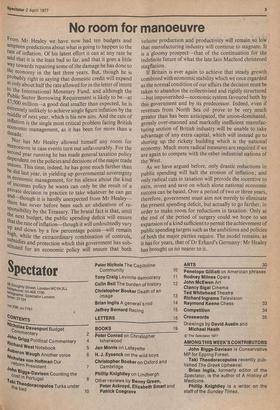No room for manoeuvre
rrom Mr Healey we have now had ten budgets and Umpteen predictions about what is going to happen to the rate of inflation. Of his latest effort it can at any rate be said that it is the least bad so far, and that it goes a little way towards repairing some of the damage he has done to the economy in the last three years. But, though he is Probably right in saying that domestic credit will expand at only about half the rate allowed for in the letter of intent to the International Monetary Fund, and although the Public Sector Borrowing Requirement is likely to be—at -/,500 million—a good deal smaller than expected, he is extremely unlikely to achieve single figure inflation by the iniddle of next year, which is his new aim. And the rate of inflation is the single most critical problem facing British economic 'management, as it has been for more than a uecade, Nor has Mr Healey allowed himself any room for manoeuvre in case events turn out unfavourably. For the second year running he has made general taxation policy nePendent on the policies and decisions of the major trade Lilni°ns. This time, indeed, he has gone much farther than ne did last year, in yielding up governmental sovereignty inceeonomic management, for his silence about the kind °I incomes policy he wants can only be the result of a Private decision in practice to take whatever he can get taLnd—though it is hardly unexpected from Mr Healey-_ ,,nere has never before been such an abdication of reTonsibility by the Treasury. The brutal fact is that, until lt,ie next budget, the public spending deficit will ensure _tnat the rate of inflation—though it will undoubtedly vary hup and down by a few percentage points—will remain suTh, while the extraordinary combination of controls, sv.nsidies and protection which this government has sub 'tiled for an economic policy will ensure that both volume production and productivity will remain so low that manufacturing industry will continue to stagnate. It is a gloomy prospect—that of the continuation for the indefinite future of what the late lain Macleod christened stagflation.
If Britain is ever again to achieve that steady growth combined with economic stability which we once regarded as the normal condition of our affairs the decision must be taken to abandon the collectivised and rigidly structured —but impoverished—economic system favoured both by this government and by its predecessor. Indeed, even if revenues from North Sea oil prove to be very much greater than has been anticipated, the union-dominated, grossly over-manned and markedly inefficient manufacturing section of British industry will be unable to take advantage of any extra capital, which will instead go to shoring up the rickety building which is the national economy. Much more radical measures are required if we are again to compete with the other industrial nations of the West.
As we have argued before, only drastic reductions in public spending will halt the erosion of inflation; and only radical cuts in taxation will provide the incentive to earn, invest and save on which alone national economic success can be based. Over a period of two or three years, therefore, government must aim not merely to eliminate the present spending deficit, but actually to go farther, in order to make room for reductions in taxation. Only at the end of the period of surgery could we hope to see expansion of a kind sufficient to permit the achievement of public spending targets such as the ambitions and policies of both the major parties require. The model remains, as it has for years, that of Dr Erhard's Germany: Mr Healey has brought us no nearer to it.






































 Previous page
Previous page